NEBRASKA LEGISLATURE
The official site of the Nebraska Unicameral Legislature

Sen. Megan Hunt
District 8
The content of these pages is developed and maintained by, and is the sole responsibility of, the individual senator's office and may not reflect the views of the Nebraska Legislature. Questions and comments about the content should be directed to the senator's office at mhunt@leg.ne.gov
January 4th, 2024
Dear friends and neighbors,
As we step into this new legislative session, I am filled with hope and determination to enact positive change for our community. Our unwavering focus remains on championing bills that promote equity, ensure housing stability, and remove discriminatory barriers. Together, our collective efforts will ensure our state thrives by uplifting every individual and family.
Yesterday I prioritized LB307, which would empower local jurisdictions to authorize public health programs to distribute hypodermic needles as part of public health efforts to reduce the spread of infectious diseases such as HIV and Hepatitis C.
I also introduced two bills to protect students facing eviction during the school year (LB845) and to reduce the prevalence of bed bugs and evictions (LB846). Today, I introduced LB913, a bill to extend postpartum care to all women and people who need it.
This year, my primary focus is continuing the work on bills I introduced last year, which carry over into this new session. You can view the full list of bills I have introduced since last session here. These bills encapsulate our shared vision for a better state.
I’m looking forward to a legislative session that prioritizes things that improve the lives of all Nebraskans like workforce, housing, and attracting and retaining talent, rather than targeting groups that are already marginalized or struggling. Let’s use these 59 days to do good.
All the best,
Meg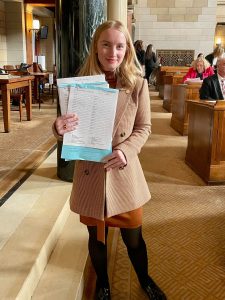
Priority Bill – LB307
As I mentioned, I am designating LB307 as my personal priority bill for this year. It was my priority bill last year but was not scheduled for debate. It remains on General File and is in a good position to see early debate with bipartisan support this year.
LB 307 would allow local jurisdictions to authorize public or behavioral health programs to distribute hypodermic needles as part of public health efforts to reduce the spread of infectious diseases such as HIV and Hepatitis C. Such programs are known as Syringe Service Programs (SSPs). SSPs protect the public and first responders by facilitating the safe use and disposal of syringes; curbing outbreaks of disease; and encouraging intravenous drug users facing addiction to access treatment.
Nebraska’s HIV infection rate has shown an alarming trend in the years since the pandemic: 2021 saw the highest number of new infections in more than a decade, a figure largely driven by an uptick in rural counties’ infection rates. As fentanyl prices drop and more of the drug is trafficked, fentanyl overdose incidents are on the rise. 214 Nebraskans died of overdose in 2021. SSPs can help address each of these issues by providing comprehensive services such as fentanyl test strips, overdose prevention education, and referrals to substance abuse treatment programs. SSPs are proven to reduce the incidence of HIV, hepatitis C, and other bloodborne diseases by as much as 50%, and SSP participants are five times more likely to enter treatment and engage in long-term recovery than users who do not use an SSP.
Under current Nebraska law, a local jurisdiction that wishes to authorize an SSP is prohibited from doing so by the Uniform Controlled Substances Act. With LB 307, the legislature could grant localities a powerful tool to exercise local control and the discretion to meet their community’s needs as they see fit. In a rural community, there might not be any good option for a brick-and-mortar location that could house an SSP. In those places, the community could implement the program through their local pharmacy, or do something more innovative like a mobile service unit. With LB 307 we leave that up to the local jurisdiction, who can set the parameters for their particular program. The bill does not require any locality to adopt such a program.
The Committee Amendment (AM381) was suggested by expert physicians with the Nebraska Medical Association, who encouraged us to provide some legal protection for program participants. If an intravenous drug user is trying to do the right thing by using more safely through an SSP and potentially seeking resources to help overcome their addiction, we do not want to criminalize them. AM 381 shields users from criminal liability related to their use of SSP services, which could be a major deterrent to anyone who would otherwise want to use an SSP. There is no cost to the state associated with LB 307. When we consider that the average lifetime cost of treating a person living with HIV is somewhere around $420,000, this is a preventive measure that can provide significant cost savings to the State. Additionally, there may be funding available to fund SSPs through the federal Substance Abuse and Mental Health Service Administration (SAMHSA) or the Opioid Settlement Fund.
This bill came out of committee with 7 yes votes, not a single no vote, and has bipartisan support from the Douglas County Sheriff, Nebraska Medical Association, The R Street Institute (a conservative, free-market think tank), the Nebraska AIDS Project, Centerpointe, the Nebraska Association of Behavioral Health Organizations, and OutNebraska. My office is working to solidify official support from public health directors, the UNMC College of Public Health, NACO, and the League of Municipalities in advance of the debate.
District 8 Events
Christmas Tree Disposal
- Sites close on Jan. 9th
- Click here for a full list of locations and requirements
- Jan. 5th, starting at 5pm
Folk House Concerts at the Castle
- Jan. 12th at Joslyn Castle Carriage House
- Jan. 13th at Culxr House at 7pm (tickets $20)
Gender Fluids by Big Canvas Comedy
- Jan. 19th at Blackstone Theater at 8:30pm (tickets $10)
- Comics from across the gender spectrum showcase their comedy skills
- St. Cecilia Cathedral on Jan. 26th, 27th, and 28th
- July 27th and 28th
Our Office in the News
Omaha World-Herald – Nebraska Legislature kicks off 2024 with multiple workforce development bills
KETV Omaha – 2024 means $12 minimum wage in Nebraska, but no change for tipped employees
News Channel Nebraska – No shortage of critics for Pillen’s suggested sales tax hike
Lincoln Journal Star – Ernie Chambers, others plead for Pillen to accept summer food aid for Nebraska children
KETV Omaha – Nebraska Legislature focused on property tax relief, and workforce solutions in 2024
Lincoln Journal Star – League of Women Voters of Nebraska files amicus brief in Planned Parenthood case
Dear friends and neighbors,
Today I was informed by the Nebraska Accountability and Disclosure Commission (NADC) that because of a complaint filed by David Begley, I am under official investigation for a conflict of interest for having a trans child and voting against LB574. My colleagues stood up offering me their kind words and disapproval of this complaint.
I don’t need their words. I need their vote. My child needs their vote. Children and families from across our state need their votes. Words are meaningless unless you put action behind them. I will continue to advocate for our children – yours, theirs, and mine – no matter what harassment or intimidation comes my way.
All the best,
Meg
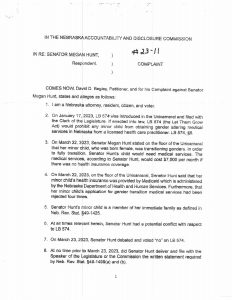
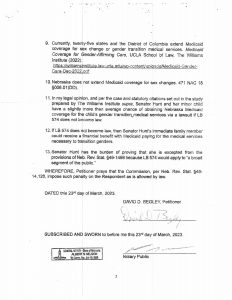
This is using the legal system that we have in our state to stop corruption, to increase transparency, and to hold governments accountable and instead use it to harass a member of the Legislature. You can view my comments on this blatant harassment here.
January 9th, 2023
Dear friends and neighbors,
At the start of each biennium, before the Legislature can begin our work to address issues to move our state forward, we must first agree upon internal rules to govern our legislative session. This is a point of contention this year, as the new conservative supermajority has signaled their intentions to alter our rules to sway the balance of power further in their favor and remove the nonpartisan safeguards we have had in place since the inception of the Unicameral. As a defender of our institution, above all else, I am committed to upholding our norms, rules, and procedures – but I need your help.
The public hearing on proposed internal Legislative rule changes has been scheduled for Thursday, at 1:30 pm in Room 1525 of the Capitol. As Nebraska’s Second House, we need to hear from you. If you can, come testify during the rules hearing and ensure lawmakers hear directly from you that you value our unique nonpartisan institution – and that the public deserves more notice and involvement in this process.
There are 52 proposals on the table that have been submitted to the committee. Among them are measures that threaten to eliminate the political balance on the redistricting committee; to make committee executive sessions closed to the media; to change the balance of members on committees; and an arbitrary cap on the amount of bills senators can introduce. One of those measures I’m most concerned about is a proposal that would do away with our 86-year tradition of using “secret ballots” to elect committee leaders. This process has been used since the unicameral was created in order to eliminate partisan pressure on senators and allow them to anonymously make decisions about who is the best person to lead a committee. These efforts are a clear, direct attack on our institution, our unique method of lawmaking, and our long-held traditions.
Don’t be fooled, these attacks won’t stop here. We need your help to protect the nonpartisanship of the Legislature. I hope to see you testifying in room 1525 on Thursday.
All the best,
Meg
Come Testify!
Thursday, January 12th
1:30 pm
Room 1525, State Capitol
List of Proposed Rule Changes
The list includes the top line of each of the 52 proposed rule changes that will be discussed this session. A more detailed list, containing exact wording will be released soon.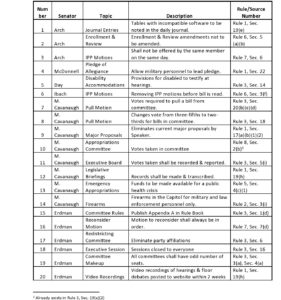
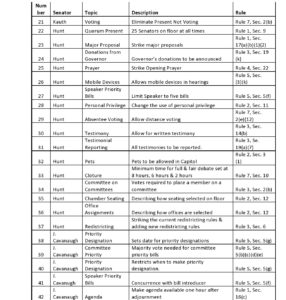
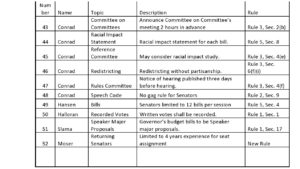
September 13th, 2022
Dear friends and neighbors,
Failed Trump-supported Gubernatorial candidate Charles Herbster’s new political action committee is leading the highly partisan effort to scrap a fundamental pillar of our nonpartisan Unicameral: the unique system of electing committee chairs by secret ballot. Secret ballots allow lawmakers to base their votes on their own convictions and the needs of their districts, rather than taking orders from a political party. George Norris, who first advocated for the unicameral system, said that such a body would allow senators to concentrate on local interests without being influenced by national party lines. National party lines, he argued, often have little to do with local government.
Our legislature is not partisan. But it is personal. And that is what makes it unique and effective. There are 49 of us, each of us can introduce as many bills as we want, and each of us can designate our own personal priority bill. Any of us can speak on a bill and offer whatever motion or amendment we would like to on that bill or topic. This arrangement provides for meaningful representation of our constituents in government. We need not filter things through parties or outside forces like egotistical billionaires who are unable to get elected.
We also elect our leadership on a personal basis, in order to maintain some sense of civility. A function of the secret ballot is that if a candidate for a committee chair is not elected, that person need not brood and dwell on it and retaliate against their colleagues throughout the session by looking at the vote score. In other words, the secret ballot is a very pragmatic, yet important feature of our system of electing leadership. There’s always a way to forgive a colleague, move on and continue with the business of the state, instead of in-fighting, partisan or otherwise, within the body.
This is probably news to Charles W. Herbster and his lobbyist, longtime GOP staffer Rod Edwards, but even a casual observer of the legislature would know that most of the committee chairs were not even contested last session.
This proposed change is not about transparency. It’s about dismantling our Unicameral. Legislators are elected as chairs of committees not because of loyalty to a party or their political pedigree. They are elected because of their expertise and familiarity with the committee’s subject matter, the legislative rules, or both. They are elected because they have the ability to facilitate a public body in a meaningful way that lets all sides of various issues be heard and weigh in on policy. They are elected because they are leaders among their colleagues, even those of differing political viewpoints. They should not be elected because Charles Herbster says that they are a ‘good senator.’
If the legislature considers rule changes, tradition, prerogative, and the historical authority of the legislative branch provides that the legislature should actually weigh its merits. And perhaps other elected officials’ opinions may be considered, but the shortsighted and selfish motivations of a perennial self-funded candidate should not be. After all, no one has thought it wise to actually elect Charles W. Herbster to any office, ever. And since he has never been elected to anything, he’s never been elected to serve in the legislature. Of course, he has no understanding or appreciation for our rules, procedures, traditions, or the way that we do things there.
While I suppose money can buy you things like presidential appointments to show committees, along with staff and lawyers to defend yourself against sexual battery lawsuits, they should not be able to buy rule changes in our very unique unicameral government. This is not to say that the legislature should not consider the peoples’ opinions of who we represent when deciding what our rules should be. But, I for one, am not going to be bullied by political hitmen with an arbitrary late September deadline to sign onto some silly pledge.
I encourage my colleagues to reject that effort for what it is: an effort by Charles W. Herbster to try to be politically relevant. He’s never been in the legislature, to my knowledge he’s never even appeared and testified before a committee of the legislature. I don’t think he has any kind of knowledge of our legislative rules, procedures, or traditions. He is simply trying to heckle his way onto the stage of politics in the state.
Voting to eliminate secret ballots means voting to change our legislature into something partisan. Voting to change our system to majority and minority. This rule change does not promote the public interest and it does not promote transparency in the furtherance of the public interest. I took an oath to represent the people of my district, not to represent a party. I am proud to be for this nonpartisan institution and I am committed to protecting it.
Best,
Meg

Rally at Omaha City Hall on May 3 in support of abortion rights organized by ACLU of Nebraska, Planned Parenthood, I Be Black Girl and the Women’s Fund. Photo credit: Lyndsay Dunn NOISE
BY. SEN. MEGAN HUNT, LD-8
On May 2, in a truly unprecedented event, a draft decision on the Dobbs v. Jackson U.S. Supreme Court case was leaked to the public. If that opinion becomes final, it will strike down Roe v. Wade and set back fundamental rights in this country by half a century. It’s important to note this is not yet an official ruling—but in Nebraska, we should prepare for the worst.
If this leaked opinion becomes official and Roe is overturned, it will be up to each individual state to determine whether women have the right to an abortion. Under our current law in Nebraska, abortion will remain legal until 20 weeks, with exceptions for life endangerment or severely compromised health.
However, that could change very quickly. Soon after the Supreme Court ruling becomes official, the Nebraska Legislature will convene for a special session and once again, try to pass a total ban on abortion in our state. Though the legislature successfully blocked a bill to ban abortion this year, we didn’t protect the right to abortion in our state for good. We only bought more time for Nebraskans to organize, unite, and strategize for a future in Nebraska without legal abortion care.
“If the Nebraska Legislature does convene a special session to ban abortion, I can promise that anti-choice politicians will have an uphill battle, because they will have to go through me. ”
While the leak of Justice Alito’s opinion was unexpected, the decision to overturn Roe is not. Far right extremists have been intent on eviscerating federal civil rights protections and regressing the country to an era of forced birth for decades. This outcome is no surprise to the people who have long been working for abortion justice outside the realm of electoral politics, because they never counted on the courts or the Democratic Party to save them.
Of course, voting matters. The ideological balance in the Nebraska Legislature is the only reason Nebraska will not immediately have an abortion ban if Roe is overturned. However, repeated calls to simply vote the problem away—which totally disregard voter suppression laws, those who live and pay taxes in Nebraska but do not have the right to vote, and our current cultural hostility to democracy—ignore how effectively the far right has captured the power of so many institutions outside of the electoral process.
There are many things we must do in addition to voting to change our culture and move the needle toward justice. World Health Organization guidance states that individuals in the first trimester of pregnancy can self-manage a medication for an abortion without direct supervision of a health-care provider. We can expect self-managed abortion to grow more prevalent in years to come, and there are a growing number of resources to learn about the research and efficacy of these methods. In addition to increased education around self-managed abortion and legal protections for those who choose this type of care, local funds for abortion services, including legal defense funds, will play a greater role in our public health landscape. This is infrastructure that abortion justice advocates have been building for decades to protect the right to abortion even when legislators fail to.
Abortion is a right. Abortion is health care.
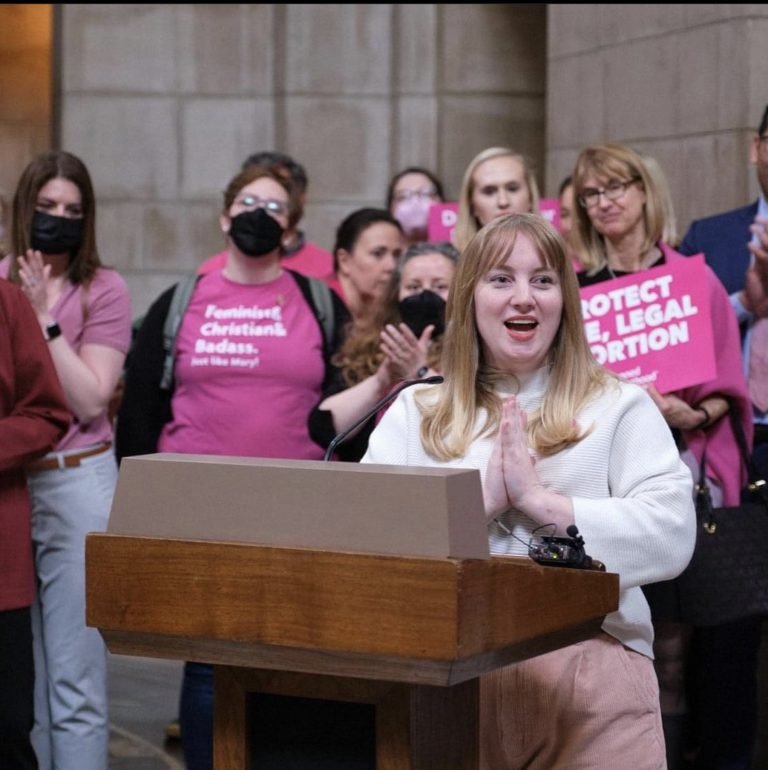
SEN. MEGAN HUNT “And the decision about whether and when to become a parent does not belong to the government.”
And the decision about whether and when to become a parent does not belong to the government. However we personally feel about abortion, individuals should have the option to make these decisions without political interference. If the Nebraska Legislature does convene a special session to ban abortion, I can promise that anti-choice politicians will have an uphill battle, because they will have to go through me. Whatever the outcome is, we must remember that the power is not in the legislature, in Congress, or even in the courts. The power is with us, our communities, and in our commitment to an ethic of compassion and trust in each other.
April 6th, 2022

We urged reproductive rights supporters to wear pink at the Nebraska State Capitol while lawmakers debated a bill that bans abortion. I am proud to stand with advocates and my colleagues to support Nebraskans’ rights.
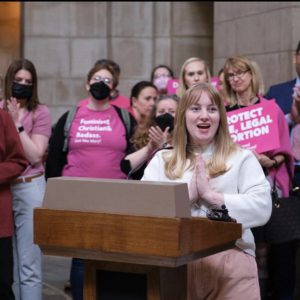

|
|
March 22nd, 2022
LB 121 Advances to Select File
On Tuesday, March 22nd, during floor debate my priority bill LB121 advanced from General File to Select File with 25 yes votes, 17 no votes, and 3 present not voting. Select File is the second stage of debate where a bill is considered by the full legislature. To advance from Select File, a bill must receive 25 yes votes.
LB121 would remove the lifetime Supplemental Nutrition Assistance Program (SNAP) ban that denies food assistance to Nebraskans that have had certain drug-related convictions. Under current statute, an individual with a drug-related conviction is ineligible to receive SNAP benefits for life. This ban is counterproductive to the reintegration of formerly incarcerated individuals.
* vote count from General File, the first stage of debate *
Voting NO: Albrecht, Brewer, Briese, Clements, Erdman, Flood, Halloran, Hansen B., Hilgers, Hughes, Jacobson, Lindstrom, Lowe, Moser, Murman, Sanders, Slama
Present – Not Voting: Aguilar, Arch, Linehan
Voting YES: Blood, Bostar, Brandt, Cavanaugh J., Cavanaugh M., Day, DeBoer, Dorn, Geist, Gragert, Hansen M., Hunt, Kolterman, Lathrop, McCollister, McDonnell, McKinney, Morfeld, Pansing Brooks, Stinner, Vargas, Walz, Wayne, Williams, Wishart
|
|
|
|
|
|
|
|
|
|
Articles about LB121 in the News
|
|
March 17th, 2022
|
|
|
|
|
|
|
|
|
|
|
|
|
|
|
|
|
|
|
|
|
|
|
|
|
|
|
|
|
|
January 25th, 2022
|
|
|
|
|
|
|
|
|
|
|
|
|
|
|
|
|
|
|
|
September 28th, 2021
Apply here!
Interns will gain a unique, first-hand understanding of the Nebraska Unicameral operations and the legislative process in a fast-paced environment. Internship applications are due Friday, November 19, 2021, by midnight. The selected applicants will begin their internship concurrently with the 2022 legislative session on January 5th.
Responsibilities may include:
– Attending committee hearings
– Drafting correspondence
– Conducting legislative research
– Event coordinating
– Bill proposal research
– General office management
– Social media engagement
– Basic photography and videography
Requirements:
– Current undergraduate student
– Good verbal and written communication skills
– Ability to work in a fast-paced environment
– Self-motivated
– Ability to work ~10 hours/week (flexible)
Sen. Megan Hunt
P.O. Box 94604
Lincoln, NE 68509
(402) 471-2722
Email: mhunt@leg.ne.gov
- Column (47)
- District Info (4)
- Events (6)
- Opinion (2)
- Press Releases (24)
- Uncategorized (7)
- Welcome (1)
You are currently browsing the archives for the Column category.
-
Business and Labor
Committee On Committees
Government
Military and Veterans Affairs
Urban Affairs
State-Tribal Relations

Streaming video provided by Nebraska Public Media






